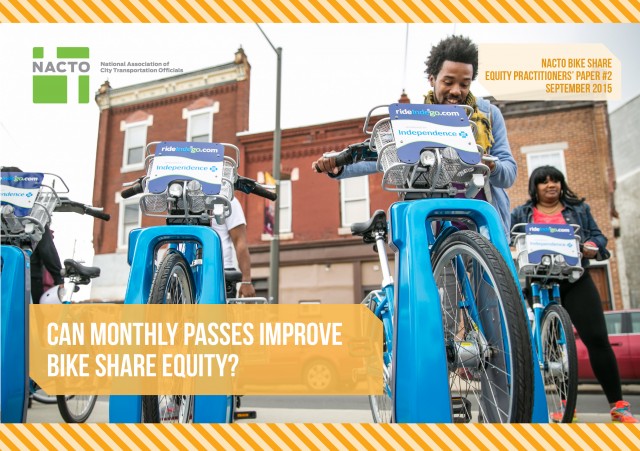Can Monthly Passes Improve Bike Share Equity?
Sep 16, 2015
Cities can increase users, equity by offering monthly membership and payment options
NACTO releases second paper in “Practitioners’ Paper” series to highlight best practices for cities aiming to address equity issues while introducing or expanding their bike share systems
NEW YORK (September 16, 2015) – Adding monthly membership options to bike share pricing plans may increase bike share enrollment, especially among low-income potential riders, new research from NACTO finds. NACTO’s second Equity Practitioners’ Paper, Can Monthly Passes Improve Bike Share Equity, uses research from comparable industries, findings from focus groups, and reports from outreach ambassadors to explore the impact of bike share pricing structures on sign-up rates. As cities continue to look for ways to better engage low-income potential riders, adding monthly membership options which offer greater financial flexibility and reduce “sticker shock” should be considered.
In particular, NACTO finds that low-income people may especially benefit from installment options or monthly memberships. While evidence suggests that the total cost of an annual bike share membership is not an insurmountable barrier for most low-income people, many low-income people have difficulties coming up with the lump-sum payment for annual membership. Indeed, NACTO’s analysis of comparable transit pass purchases reveals that low-income people are more likely to purchase short-term memberships than people in higher income brackets.
NACTO’s research suggest that monthly membership options can help make bike share more accessible to people across all income brackets. Strong promotion of monthly options and expressing prices in monthly installments, as opposed to annual rates, may help reduce sticker shock. When asked in focus groups in Philadelphia and Denver, most low-income people expressed comfort with spending $10-20 per month on bike share, provided that it took them where they needed to go. NACTO also found that low-income people tend to get information about bike share from the bike share stations themselves. As a result, the stations are often a missed opportunity to spread information and attract new riders. A greater focus on ensuring high-quality marketing materials at the stations may also help increase ridership.
In Can Monthly Passes Improve Bike Share Equity?, NACTO also analyzes the impact of other commonly used equity initiatives such as deeply discounted annual memberships and alternatives to credit cards. Such programs can bring in new members, especially when combined with extensive marketing and promotions. However, research suggests that modifications to pricing structures – as opposed to discounts – may bring in more new members while freeing up money for other equity initiatives. In addition, many low-income people have personal credit cards, although rates vary widely by region or even within cities.
Finally, the research findings suggest that monthly membership plans may have benefits for cities and operators as well. NACTO’s analysis considers comparable attendance and renewal rates from gyms, which show that members who were billed monthly, as opposed to annually, went to the gym more consistently, and that more consistent use was associated with higher annual renewal rates. Such findings have significant implications for bike share pricing as cities and operators look to increase ridership and revenues.
Can Monthly Passes Improve Bike Share Equity? is the second in NACTO’s Equity Practitioners’ Papers series which identify best practices for cities introducing or expanding bike share systems and explore strategies to increase the number of low-income people who use and benefit from bike share systems.
The NACTO Bike Share Program is led by Kate Fillin-Yeh, the former Director of NYC DOT’s Bike Share Program. At NYC DOT Kate was responsible for the system planning, outreach and implementation of New York’s Citi Bike system. Kate is also the author of New York City’s 2009 bike share feasibility study, Bike Share Opportunities in New York City.
NACTO is a member of the Better Bike Share Partnership, a JPB funded collaboration between The City of Philadelphia, Bicycle Coalition of Greater Philadelphia, NACTO, and PeopleForBikes, to increase access to and use of bike share in underserved communities.
For more information about NACTO’s Bike Share Program, contact Kate Fillin-Yeh, Bike Share Program Director, at kate@nacto.org.


